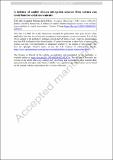A defense of usable climate mitigation science: how science can contribute to social movements
Author(s)
Drake, Henri F.; Henderson, Geoffrey
Download10584_2022_3347_ReferencePDF.pdf (1.127Mb)
Publisher Policy
Publisher Policy
Article is made available in accordance with the publisher's policy and may be subject to US copyright law. Please refer to the publisher's site for terms of use.
Terms of use
Metadata
Show full item recordAbstract
Abstract
Much of modern climate science is motivated by the problem of human-caused climate change or its potential solutions, and aims to be “usable” for relevant stakeholders. Sobel (2021) argues in this issue that the expectation for improved climate projections to drive mitigation of greenhouse gas emissions “can now be understood [as] naive about the role of politics, and the power of entrenched interests to inhibit climate action.” While he criticizes this “linear model” of the science–policy interface; he does not elaborate on alternative avenues for scientific advances to spur mitigation. Instead, he encourages physical climate scientists who wish to produce usable results to orient their work towards informing adaptation. He argues that, relative to mitigation science, adaptation science is more likely to be used by stakeholders because the remaining scientific uncertainties are larger and the social barriers to implementation are lower. We join Sobel in calling on physical climate scientists to reflect upon the pathways through which their research improves societal welfare. However, we argue that Sobel’s argument overlooks an important theory of change, namely that mitigation science is politically usable through the non-linear dynamics of social mobilization. Social theories of policy change suggest that organized groups play an outsized role in setting the policy agenda. Grassroots activism on climate, however, has historically been hindered by the abstract nature of climate change, paling in comparison to the lobbying and misinformation campaigns funded by the vested fossil fuel interests. We describe how two recent advances in mitigation science, the Transient Climate Response to cumulative Emissions (TCRE) and Extreme Event Attribution (EEA), have provided social movements with information that allows them to re-frame the climate change problem in a way that attributes blame for the problem, motivates collective action across a diverse coalition of stakeholders, and could plausibly compel policymakers to prioritize the issue in the coming years. Given the utmost importance of mitigation in preventing climate change at the source, we thus advocate for a broader agenda of usable climate research that includes co-production of both mitigation and adaptation science.
Date issued
2022-05-16Department
Massachusetts Institute of Technology. Program in Atmospheres, Oceans, and ClimatePublisher
Springer Netherlands
Citation
Climatic Change. 2022 May 16;172(1-2):10
Version: Author's final manuscript